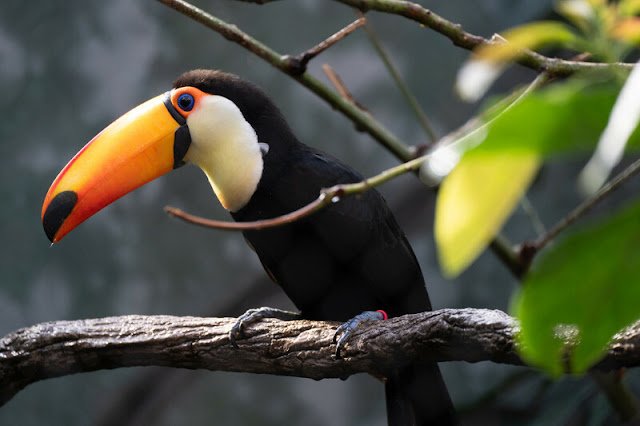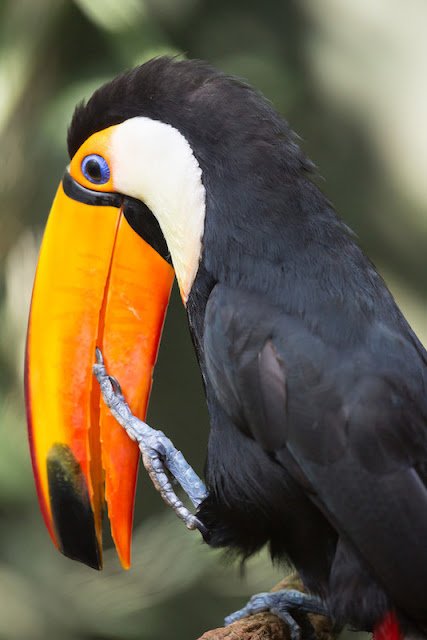Posted by Hattie Potter, Development
 |
| Photo: Jeremy Dwyer-Lindgren/Woodland Park Zoo |
How much do you know about other tucans than they have big beak and are often “connected” with a fruity, sugary grain? These beautiful and colorful birds are native to the tropical rainforests of Central and South America. They spend most of their lives high up in the trees, where they hook in wooden cavities and find many of their food sources. Woodland Park Zoo’s Too Toucans – one of the larger of the many species of this bird – can be found in our tropical rainforest and their long, lively bills make them almost impossible to miss!
Let’s get to know more using animal holders Erin and Kayla:
There are currently two toucans living at the zoo – a man and a woman. Our male Toucan hatched on March 17, 2012, making him 12 years old. His name is Patrick in honor of being born on St. Patrick’s Day!
Our female Toucan was wasted on June 2, 2022, which made her just over 2 years old. She has not yet been officially appointed, but her care team knows her as Sandy!
Where did they hatch?
Patrick hatched out at the Zoo Atlanta and Sandy hatched in the Fort Worth Zoo.
How do you separate them from each other?
If you happen to see them side by side, you may notice that Patrick’s bill is a little longer. He is quite a little bigger than Sandy.
The easiest way to separate the two from them is to look at their legs as Sandy has a reddish pink ribbon on its left leg.
 |
| Photo: Jeremy Dwyer-Lindgren/Woodland Park Zoo |
What are their favorite goodies and snacks?
They seem to enjoy quarter grapes and blueberries as well as a snack of what is called the Apple Jungle Pellets.
Do they come together and share their place well?
It seems, which were recently eggs found in their shared nest! We do not yet know if they are fertile, but it is still exciting, as this is the first time this has happened between the couple.
Do they have a favorite place where they like to hang out?
Usually they can be found high up in their exhibition! Lately, they have taken changing time in their specially designed nest box. Animal holders are able to access this field if needed and add wood shavings to it to stimulate interest in breeding.
 |
| Photo: Jeremy Dwyer-Lindgren/Woodland Park Zoo |
What’s the funniest thing you’ve seen Toucans do?
Sandy likes to tear into pieces of salad until all that is left is small salad strips. It creates quite a mess for her animals, but she seems to get a kick out of it!
Patrick likes to “oversee” when someone cleans their exhibition. Just provides moral support for his care team, we’re sure!
What would surprise people to know about these animals?
The Toucans are remarkably derived with their beaks, even in spite of their large size. They can even catch blueberries in the air when thrown by their animal holders!
What is something that only these animals’ care teams know about them?
Sometimes Patrick watching YouTube videos with its animal holders. Who doesn’t enjoy the occasional cute cat video?!
 |
| Photo: Dennis Dow/Woodland Park Zoo |
Can you tell us one thing you love most about working with toucans?
The confidence and relationship we have built with the couple during our time that nourishes them. They are intelligent animals and we are still learning new things about the two. They both show a lot of curiosity about their surroundings and their animal holders. It has been special to witness!
What actions can people take to help toucans in nature?
The biggest threat to wild toucans is the loss of their habitats. Rainforests are cut down to make room for roads, farms and buildings, all to the detriment of wildlife that depends on them to survive.
You can help by choosing paper and wood products certified by Forest Stewardship Council (FSC). You can also make your pantry more wildlife friendly and shop from companies that are required to use sustainable palm oil.
